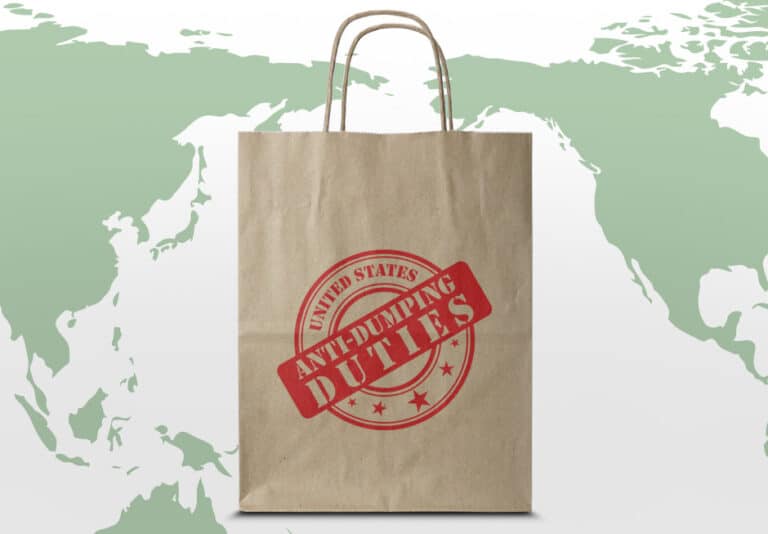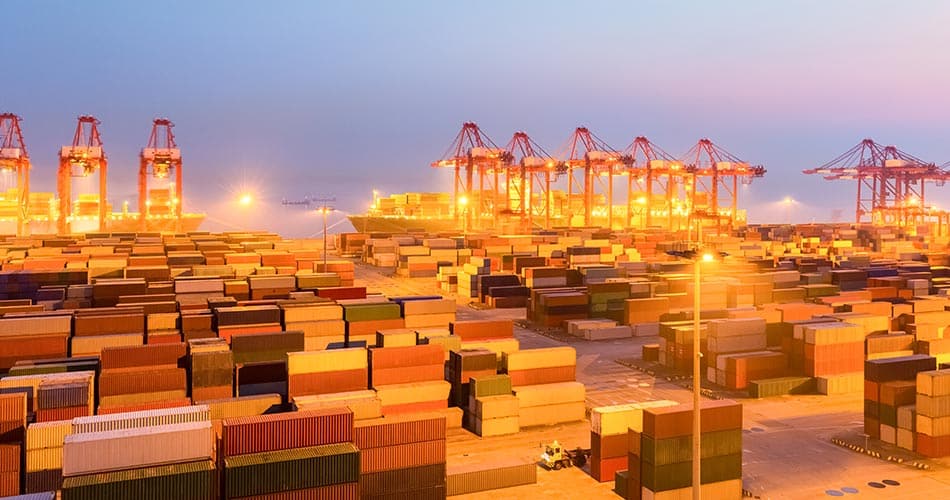On May 30, 2023 a petition was submitted to the U.S. Department of Commerce (DOC) and the U.S. International Trade Commission (ITC) that alleges that foreign countries are engaging in unfair trade practices (such as dumping and receiving subsidies) regarding imported paper shopping bags, which negatively impact the domestic paper shopping bag industry. This move has sparked a significant debate and raised questions about the implications for both the importing and exporting countries involved.
What’s this all about?
The petitioners are alleging that imports of paper shopping bags into the United States from nine implicated countries have increased recently by approximately 74%. And, this petition would impact about two-thirds of all imports of paper shopping bags.
The petition seeks to impose antidumping (AD) duties on imported paper shopping bags imported from Cambodia, China, Colombia, India, Malaysia, Portugal, Taiwan, Turkey, and Vietnam, as well as countervailing (CVD) duties specifically on imports from China and India.
The petition was filed by Novolex Holdings LLC, a company with manufacturing facilities in Kentucky, Georgia, Washington, Connecticut, and Mexico, in collaboration with the United Steel, Paper and Forestry, Rubber, Manufacturing, Energy, Allied Industrial and Service Workers International Union. American Paper Bag LLC and ProAmpac LLC did not join the petition.
 What imported paper shopping bags are being affected?
What imported paper shopping bags are being affected?
- Imported Paper shopping bags with handles of any type, regardless of printing, and regardless of how the top edges are finished (e.g., folded, serrated, or other methods). The bags can be sealed or unsealed. They must have a width of at least 4.5 inches and a depth of at least 2.5 inches.
Which imported paper bags are not affected?
- Multiwall sacks and bags.
- Paper sacks or bags that are barrel-sized (approximately 11.5-12.5 inches wide, 6.5-7.5 inches deep, and 13.5-17.5 inches high) with flat paper handles.
- Paper sacks or bags with die-cut handles, weighing less than 38 pounds, and with a height of less than 11.5 inches.
- Shopping bags with handles made entirely of woven ribbon or similar fabric and finished with folded tops, tied knots, or T-bar aglets (made of wood, metal, or plastic).
- Gift bags intended for retail sale that are bundled prior to importation, consisting of three to thirty individual bags in each bundle.
 So, what are Antidumping and Countervailing Duties you might ask?
So, what are Antidumping and Countervailing Duties you might ask?
Antidumping and countervailing duties are trade measures implemented by governments to protect domestic industries from unfair competition. Antidumping duties are imposed when imported goods are sold at a price below their fair market value, causing material injury to the domestic industry. On the other hand, countervailing duties are levied on imports that benefit from subsidies granted by their country of origin, thus creating an unfair advantage in the market.
What does the petition say about imported paper shopping bags?
The petition, submitted by the domestic manufacturers and producers, claims that the paper shopping bags from the aforementioned countries are being sold in the importing country at prices significantly lower than their normal value, thereby harming the domestic paper bag industry. Additionally, they allege that these countries are providing subsidies to their domestic paper bag manufacturers, enabling them to sell their products at artificially low prices.
Why are they filing this petition?
The filing of an antidumping and countervailing duty petition signals the concerns of domestic manufacturers and producers who fear the adverse effects of unfair competition. If the petition is successful, the importing country may impose additional duties on the targeted imports, effectively increasing their prices. This can lead to a decrease in market share for the accused countries’ exporters and potentially revive the struggling domestic paper shopping bag industry.
 What are the possible global implications?
What are the possible global implications?
The filing of such a petition raises concerns and highlights the ongoing trade disputes between nations. It is crucial to recognize that trade actions like these can strain diplomatic relationships and impact the flow of goods and services between countries. The accused countries are likely to contest the petition, arguing against the allegations of unfair trade practices. This could result in a lengthy legal process, potentially leading to increased tensions and disruptions in international trade.
 What might this mean for U.S. businesses?
What might this mean for U.S. businesses?
- Increased Costs: Imposing additional duties on paper shopping bags imported from the accused countries would raise the cost of importing these products. U.S. businesses that rely on affordable paper shopping bags for their operations would face higher costs, impacting their bottom line. This could lead to reduced profitability or increased prices for consumers.
- Reduced Competitiveness: Higher import costs due to the imposed duties can make U.S. businesses less competitive compared to their foreign counterparts in countries not subject to these regulations. This could result in a loss of market share as consumers opt for cheaper alternatives, potentially leading to a decline in sales and revenue for U.S. businesses.
- Supply Chain Disruptions: If the accused countries’ exporters face significant barriers to the U.S. market, it could disrupt established supply chains. U.S. businesses relying on a stable and consistent supply of paper shopping bags from these countries may need to find alternative suppliers, which can be time-consuming and costly. This could potentially disrupt their production schedules and impact their ability to meet customer demands.
- Retaliation from Accused Countries: The accused countries may respond to the imposition of antidumping and countervailing duties by implementing their own retaliatory measures against U.S. products. This could result in reduced access to foreign markets for U.S. businesses across various industries, leading to decreased exports and potential loss of business opportunities.
- Strained International Relations: Trade disputes and the implementation of protectionist measures can strain diplomatic relationships between countries. The filing of the petition and subsequent imposition of duties could lead to tensions between the U.S. and the accused countries, making it more challenging for U.S. businesses to engage in future trade negotiations or establish favorable trade agreements.
- Uncertainty and Market Volatility: Trade disputes and regulatory changes introduce uncertainty into the business environment. U.S. businesses may find it challenging to plan and make long-term investments when the outcome of these disputes is uncertain. Market volatility and fluctuating prices can also make it difficult to forecast sales, manage inventory, and make strategic business decisions.
And, what might this mean for American consumers?
- Higher Prices: The imposition of additional duties on imported paper shopping bags can lead to increased costs for U.S. businesses. To compensate for these higher costs, businesses may pass them on to consumers in the form of higher prices for paper shopping bags or the products they sell. This can result in increased expenses for consumers who rely on these bags for their shopping needs.
- Limited Choices: If the accused countries’ exporters face significant barriers to the U.S. market, it may limit the variety and availability of paper shopping bags. With fewer options to choose from, consumers may have to settle for alternatives that may not meet their preferences or needs. This can reduce consumer satisfaction and limit their ability to make choices based on factors like price, quality, or sustainability.
- Impact on Affordability: Higher prices for paper shopping bags can have a disproportionate impact on lower-income consumers who rely on affordable options for their shopping needs. If the cost of imported paper shopping bags increases significantly, it may strain the budgets of price-sensitive consumers or lead them to opt for reusable bags or alternative packaging materials, which may not be readily available or convenient in all situations.
- Disrupted Supply Chains: Trade disputes and regulatory changes can disrupt established supply chains, leading to potential shortages or delays in the availability of paper shopping bags. This can affect retailers’ ability to stock shelves adequately, resulting in inconvenience for consumers who may encounter difficulties in finding the specific paper bags they prefer or require for their shopping.
- Potential Impact on Related Industries: The imposition of antidumping and countervailing duties on paper shopping bags can have a ripple effect on related industries. For example, if businesses in the accused countries experience a significant decline in sales, it may impact their ability to purchase raw materials or components from U.S. suppliers, potentially affecting jobs and economic activity in those sectors.
- Reduced Market Competition: Trade protection measures can limit the entry of products from the accused countries, reducing market competition. This can hinder innovation, limit product diversity, and potentially result in reduced quality or slower advancements in the paper shopping bag industry. Limited competition can also lead to less competitive pricing, as fewer options are available to consumers.
Conclusion
The new antidumping and countervailing duty petition filed against paper shopping bags from Cambodia, China, Colombia, India, Malaysia, Portugal, Taiwan, Turkey, and Vietnam has set the stage for a contentious trade dispute. While the claims made in the petition are serious, it is crucial to consider the potential impact on U.S. domestic industries, American consumers, and the accused countries’ exporters. Striking a balance between protecting domestic industries and maintaining a healthy global trade environment is a challenging task that requires careful deliberation and cooperation between all parties involved.


 What imported paper shopping bags are being affected?
What imported paper shopping bags are being affected? So, what are Antidumping and Countervailing Duties you might ask?
So, what are Antidumping and Countervailing Duties you might ask? What are the possible global implications?
What are the possible global implications? What might this mean for U.S. businesses?
What might this mean for U.S. businesses?

Comments are closed.